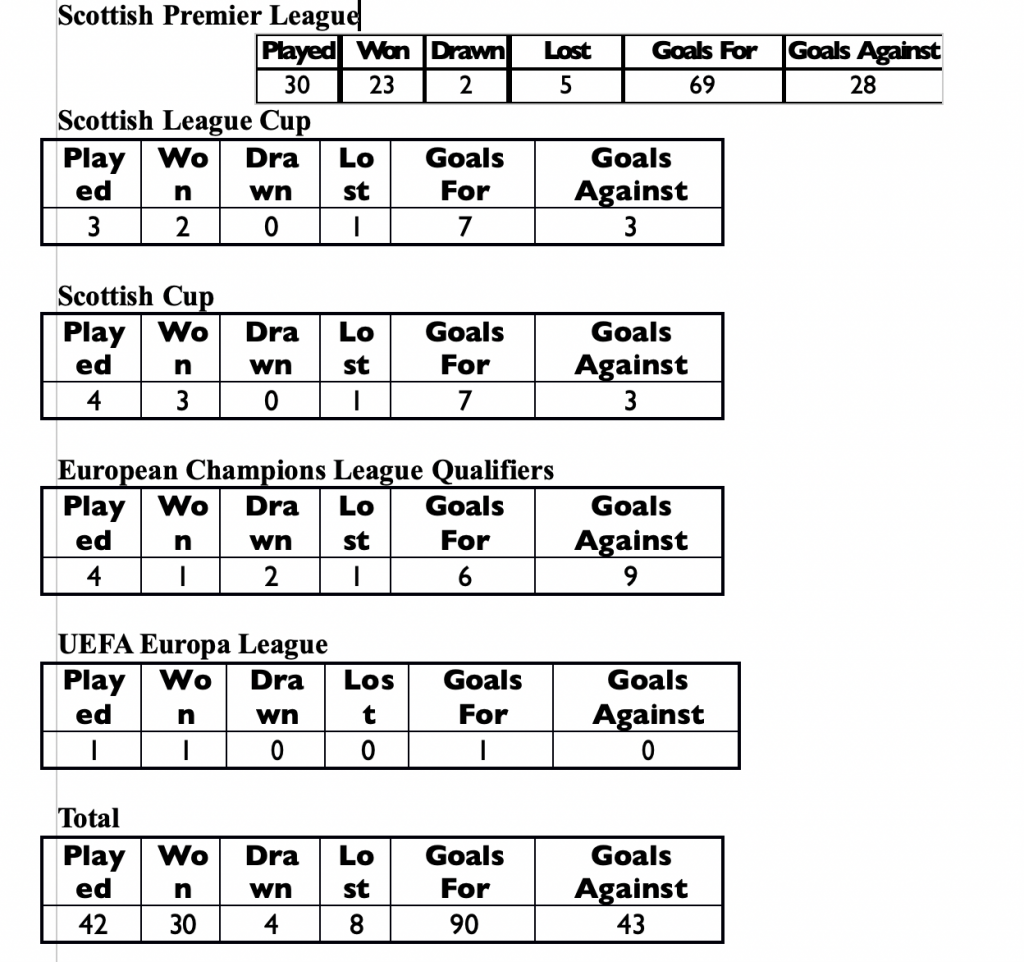By Alistair Aird
On 1 December 2022, I wrote a piece for Follow Follow entitled ‘Hidden in Plain Sight’. It was penned after I had attended the official unveiling of Michael Beale in the Blue Room at Ibrox Stadium.
I was excited.
Beale talked of allowing his forward players to ‘wreak havoc’ and ‘letting the handbrake off’. After the turgid and torpid football we had witnessed in the latter stages of the Gio van Bronckhorst era, this was like a breath of fresh air. Beale also talked of winning 56 ‘as soon as possible’ and given that a number of sources suggested he was the man with the brains and tactical nous in Steven Gerrard’s management team, we had genuine cause for optimism.
I was excited.
That excitement wasn’t tempered too much in Beale’s early matches in charge either. Rangers came back from 1-0 and 2-1 down to defeat Hibernian 3-2 at Ibrox, and that was followed by a proper ‘smash and grab’ win at Pittodrie. Going into injury time, Beale’s side trailed 2-1, but two goals from Scott Arfield secured the points.
And Beale came out with plaudits too when his first experience of managing in an Old Firm match ended 2-2. Rangers had again shown powers of recovery to bounce back from losing an early goal to lead 2-1, and had it not been for a late lapse in defence, Beale’s side would have cut the gap at the top to six points.
That draw was one of just 12 games that Beale was in charge of that Rangers didn’t win. Indeed, Beale lost only eight of the 42 matches when he was the Rangers manager. His win percentage was 71%. But when you scratch the surface, you see that four of those eight defeats came against Celtic, two in the league, one in the League Cup Final, and one in the last four of the Scottish Cup.
On reflection, it was the first of those defeats – 2-1 in the League Cup Final – that had us furrowing our brows, sporting quizzical looks, and asking questions for the first time.
Beale had signed Todd Cantwell and Nico Raskin in the January transfer window yet chose not to start either of them at Hampden. Surely, both were signed to play in matches like this. Although they may have been short of match fitness, surely giving them the first hour or 70 minutes was better than pitching them in when Rangers were chasing the game?
Perhaps my initial excitement may have been misplaced. There wasn’t yet a sense of foreboding, but seeds of doubt had been planted.
Five straight wins followed, but there would be another bump in the road when Rangers lost 3-2 at Parkhead in the league. Beale’s side had competed with Celtic, but still come up short. And a lamentable lapse in concentration would prove costly when the behemoths met again a few weeks later in the last four of the Scottish Cup. The season that followed a run to a major European Final would thus end without silverware.
Those pesky seeds had taken root and started to flourish. I was deflated.
But Beale’s Rangers put the wind back in my sails with a magnificent 3-0 win over Celtic before the season ended. This looked like we were laying down a marker, a portent of things to come perhaps. We dominated them, and although there would be a significant overhaul of the playing squad in the close season, not many Rangers supporters left the stadium that day thinking anything other than we would fight them for silverware on all fronts domestically in season 2023/24.
I was excited again.
The summer transfer window opened, and my fellow supporters and I looked forward to seeing who we would bring in. The business done by Beale in January had borne fruit – Cantwell and Raskin had both been superb – and that suggested that the manager had an eye for a player that could come in and improve our squad.
We knew by then that Beale would lose Ryan Kent and Alfredo Morelos in the summer. Neither wanted a new deal. We also knew that one of our greatest ever goalkeepers, Allan McGregor, would retire. That meant a creative player, centre forward and goalkeeper were the minimum requirements on the summer shopping list. Alas, only the recruitment of Jack Butland would more than adequately fill the voids left by those departing.
Beale pursued his targets with financial backing. He went to Italy and persuaded his number one target, the Nigerian forward, Cyriel Dessers, to come to Glasgow. Given how well Cantwell and Raskin had performed, we didn’t reflect too much on that fact that Dessers wasn’t the most prolific of centre forwards. With hindsight, we should have done.
Jack Butland, Abdallah Sima, Danilo, Jose Cifuentes, Dujon Sterling, Kieran Dowell, and Sam Lammers were among the others recruited. There would be a return to Ibrox too for Leon Balogun, a player that many felt should never have been allowed to leave in the first place.
At this stage, we all expected that these players would come in and add quality and depth to our player pool. Beale now seemed to have an embarrassment of riches to choose from, middle to front in particular, and my mind drifted back to that day in December when Beale talked of ‘wreaking havoc’. We were going to be witnessing a swashbuckling show every week as our forwards interchanged effortlessly and scored goals for fun.
There was that surge of excitement again. It didn’t last long.
As we look back on Michael Beale’s short stint as Rangers manager, his downfall started with his recruitment in the summer. Jack Butland has been an excellent addition – although he’s been a lot busier than we would have liked, he looks every inch a Rangers player, on and off the pitch – but the others could hardly be classed as the game changers some of them were expected to be.
Sterling has been stifled by Beale’s resistance to drop a clearly out of sorts James Tavernier, and Dowell and Danilo have been hampered by injury. But Lammers, Sima and Cifuentes have flattered to deceive. The jersey has appeared too heavy for them, although Sima has improved a little of late.
History has shown that it takes time to integrate a clutch of new players into a team, but that integration is much more seamless if there isn’t as much rotation. It seemed that Beale didn’t know what his favoured XI was, and the chopping and changing of personnel and team shape was another factor that contributed to the manager being relieved of his duties. A Rangers manager needs to have a mean streak and be decisive; Michael Beale was sadly lacking in both categories.
Worry was creeping in, but Beale still had our support. But that waned after we lost on the opening day of the season. He never recovered.
I have to admit it wasn’t the lack of cohesion in our play or lack of identity that worried me most at this stage. It was Beale’s lack of ambition, and this was the first time that I started to question whether he was the man I wanted with his hand on the tiller. He said on more than one occasion in press conferences ahead of the Champions League qualifiers against PSV Eindhoven that we were guaranteed group stage football irrespective of the result. Surely, he should have been aiming high, pitching for a place at the top table to dine alongside the heavyweights of the European game in the Champions League? It came across as if our manager was content with consolation prizes.
We edged out Servette 2-1 at Ibrox, but had it not been for Butland, the Champions League dream may have ended in a second leg that ended 1-1. Butland showed that he had all the attributes to be a Rangers goalkeeper as he kept the Swiss side at bay. With hindsight, losing at that point may well have been a blessing and spared Beale the pummelling against PSV in Eindhoven. That was the first nail in his coffin.
Worried? A little more than I maybe had been, but the following weekend, we welcomed an injury-ravaged Celtic to Ibrox. This was it, I thought. This is where our manager will stand up and be counted. The handbrake would be released, we would ‘wreak havoc’ and wipe the floor with our Old Firm rivals.
Seeking the positives can sometimes leave you bitterly disappointed.
Beale’s side meekly surrendered to Celtic. ‘Passive’ and ‘pathetic’ summed up our performance. The manager once again got team selection and tactics wrong. Stunting the creative influence of Todd Cantwell to protect our captain – who was becoming more of liability every week – must rank as one of the worst of a litany of errors Beale made as Rangers manager.
That should have been the end of the road. The season was still salvageable. But the board were obdurate and unmoved, although you had a feeling that you knew it was now just a matter of time.
I drew criticism for the report I wrote after the Livingston game in the League Cup. We won 4-0, our fourth win on the bounce and our fourth successive clean sheet. I had been rather negative in my reflections apparently, but it was plain to see that there were still significant issues on the pitch. And three days later, those issues came to the fore as Rangers were ravaged at home by a defensively minded Aberdeen team. It was an unacceptable performance. Action was required and was duly taken on Sunday evening.
Michael Beale’s Rangers record reads:
 Beale leaves after 10 months in charge. And perhaps the most damning indictment for him is that he does so with the football club in a worst state than it was when he took over from Giovanni van Bronckhorst.
Beale leaves after 10 months in charge. And perhaps the most damning indictment for him is that he does so with the football club in a worst state than it was when he took over from Giovanni van Bronckhorst.
The search for a new manager continues, but in the meantime, after weeks of springing leaks and taking on water, Steven Davis is the man charged with bailing us out and getting us back on to an even keel again. As always, we will back him, but the bumps and bruises suffered during a tortuous time under Michael Beale will take a long time to heal.




